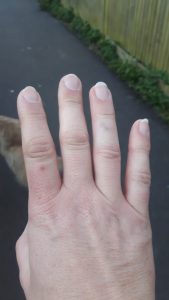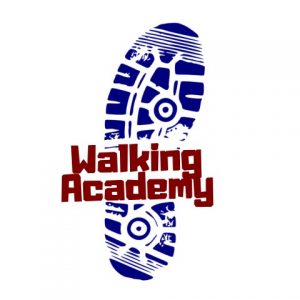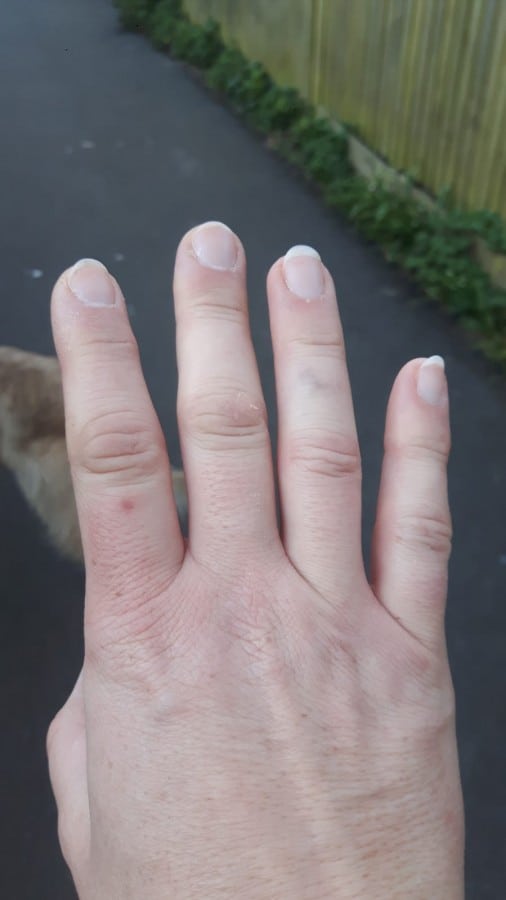Table of Contents
Some links on posts are affiliate links and will earn us a commission from qualifying purchases
Hiking is a great way to enjoy nature and get some exercise, but for some people, hiking can be uncomfortable or even painful. If your hands swell up when you walk, you’re not alone. This common problem has a few possible causes, and there are steps you can take to ease the discomfort. Keep reading to learn more about why your hands swell when hiking and what you can do to make the experience more comfortable.
I have noticed that when I go for a walk, quite often my hands swell up. Whilst I don’t think it’s a major issue, I did wonder if I should see a doctor about it. But I have done some research to try to get to the possible reasons.
There could be various reasons for my hands swelling when walking. Here are some of the possible reasons:

Do you also suffer from swollen hands when out walking, running, or any other form of other exercise? Maybe it is down to one of these things?
Understanding the anatomy of the hand
Before we delve into the causes of swollen hands on long walks, let’s take a moment to understand the anatomy of the hand. The human hand is a complex structure that consists of 27 bones, 29 joints, and numerous muscles, tendons, and ligaments. These structures work together to provide us with a remarkable range of motion and dexterity that allow us to perform a wide variety of tasks, from simple everyday activities to complex manual tasks.
The muscles and tendons in the hand are responsible for flexing and extending the fingers and thumb, while the ligaments provide stability to the joints. The fingers and thumb are also surrounded by a network of blood vessels and nerves that supply oxygen and nutrients to the tissues and allow us to feel sensations such as touch and temperature.
What are swollen hands a sign of?
Let’s look at why our hands swell when walking.
Blood flow
When walking your hands and feet start to warm up as you exercise more. Especially when you start out on a cold day. This is because your heart is beating more vigorously, and so you get warmer. You need to sweat some of that heat away, and so the heart will pump blood out to the body’s extremities.
I did read that your feet can swell a whole size when exercising, so it is important to ensure you don’t buy walking shoes or boots that are too tight, and allow for some growth.
Lack of arm motion
If you are walking with your arms down by your side all the time, you can quite easily get swollen hands. I think this is my main reason as it happens more when I am not pumping my arms. The heart pumps more blood to your arms, hand, legs and feet whilst exercising, as explained above. But if your arms are just down by your side and you aren’t using your arm muscles then the blood will not pump back away from your hands so quickly, and so it is gathering in your fingers and hands.
Try raising your hands above the level of your heart for a while. I remember when I first started walking seeing a couple of people in the distance with their arms raised above their heads – now I know they were probably trying to get the blood pumping away out of their arms more, but at the time it did make me wonder what they were doing.
You may want to keep rotating your arms every half mile or so in small circles. thsi will keep your hands moving and assist.
However probably the best thing you could do is to adopt the power walking position of keeping your arms bent at about 90 degrees and pumping them back and forth as you walk. This will not only keep your arm muscles working and pumping the blood away, but will also raise your arms to the level of your heart or more.
Bites or stings
It is possible that you have been bitten or stung by an insect, bee or wasp. If you have been bitten by an insect it tends to inject something called formic acid. As well as swelling this can also cause redness, itching and possibly even blisters. These should calm down after a few hours but if you find they are still causing you issues the following day then it’s probably best to head to a pharmacy and ask their advice.
If you do find that you are attractive to insects then it may well be worth talking to a pharmacist who should be able to recommend a repellent spray to keep the insects at bay whilst you exercise outdoors.
I remember walking at Bewl Water near Lamberhurst once. It was a nice autumn day, not too hot but certainly not cold. I had decided to wear a polo shirt that I have, but as it was bright yellow it was covered in insects as we walked past the wooded sections around the reservoir. Poor Nicky had to brush me clear every 50 yards or so. So my own bonus tip is don’t wear yellow!
Hydration levels
It is possible that you are dehydrating, although I have also heard that water retention can be a cause. Did you drink enough water before you left for your walk, and have you been topping up by regularly sipping water as you walk?
Ensure you keep drinking water regularly whilst you do any exercise. When walking it is so easy to not realise the amount of fluid that your body is losing, so please keep sipping before you feel thirsty. You can read more about water and walking here.
Minerals
When you sweat you lose some of your minerals, mainly salt, from your body. So as well as drinking water you may find that drinking an eloctrolyte sports drink may assist you in redressing this imbalance.
If you have seen any of the marathons on TV you will the top runners darting towards their own bottles at the drinks stations. These are sports drinks that they have tested to match their own unique requirements when it comes to replacing the minerals and electrolytes in their body.
Whilst you probably won’t need to specifically getting your own unique drink, a general sports drink will benefit you and may help with swollen hands.
What else can you do to prevent swollen hands?
Let’s take a look at some things you can do to help prevent or relieve swelling in hands.
Relaxing your arms when walking
Try to keep your arms relaxed – don’t clench your hands, keep them slightly open. Regularly stretch your hands and as suggested above rotate your hands in small circles.
Hands Up Hands High
This is a great saying to remember once you notice your hands swelling. Don’t forget to raise your hands above your heart or even your head. Movement is the key thing here.
Using walking poles
Have you considered using walking poles? Holding the poles will help you by using your muscles, and the action required will also raise your hands high, thus helping to keep your blood flowing. It is said that walking with poles is a great workout – much better for you than it looks.
Squeezing a stress ball
If walking with poles is not an attractive alternative to you, why not carry a small stress ball, and gently squeeze it from time to time, swapping hands as you go. This will assist your muscles working too and the movement should get your blood flowing.
Removing Rings
Make sure you remove rings before you set off if your hands swell often. You don’t want to cause circulation issues to the tips of your fingers. If you do insist on wearing them, will they fit snugly on one of your other fingers? Or why not attach them to a chain? If they are at home they should be safer too and won’t get lost and never found.
Watch/Fitness bands
You may want to also wear watches and any smart fitness bands slightly higher on your arm. You will probably have to loosen them a notch to do so.
Timing your walk for a cooler part of the day
Of course the easiest thing you can do is to go out at a cooler part of the day, although this may not always be practical. But if the heat does cause you an issue, would you be able to rise an hour earlier each day during the warmer months in order to get your walks in at a time that will cause you the least discomfort? A bit of change in your daily routine could go a long way to help you.
When to seek medical attention for swollen hands during long walks
In most cases, swollen hands on long walks are not a cause for concern and can be treated with rest and self-care measures. However, if you experience severe or persistent swelling, pain, or numbness in your hands or fingers, it’s important to seek medical attention.
These symptoms can be a sign of a more serious condition, such as carpal tunnel syndrome or arthritis. Your doctor can help you determine the underlying cause of your symptoms and recommend appropriate treatment.
Conclusion – Why do my hands swell when walking?
Swollen hands on long walks can be uncomfortable and inconvenient, but they are usually not a cause for concern. By understanding the causes of swollen hands and taking steps to prevent and treat this condition, you can enjoy your long walks and hikes with greater comfort and ease.
Remember to stay hydrated, use proper grip and technique, stretch and exercise your hands, and use appropriate tools and gear to prevent swelling and discomfort. And if you experience severe or persistent symptoms, don’t hesitate to seek medical attention. With these tips and strategies, you can optimize your performance and enhance your overall experience on long walks and hikes.
Recent Posts
I always advocate having water to hand when walking, and whilst I probably don't drink enough water day to day, if I am going on a long walk I will always have at least one bottle with me. I also...
The summer of 2018 was a great summer, with some really hot days. Which is lovely if you are sitting by a pool or on the beach, but what happens if you are out putting in the miles walking and the...


